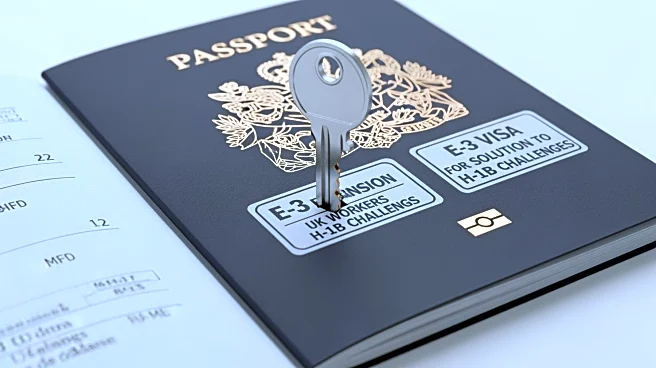What's Happening?
The E-3 visa, currently available only to Australian nationals, is being considered for expansion to include UK workers. This proposal aims to address the limitations of the H-1B visa, which is facing
new regulations, increased fees, and strict caps. The E-3 visa allows professionals in specialty occupations to work in the U.S. with minimal bureaucracy and has an annual cap of 10,500, which is rarely reached. The expansion is seen as a way to enhance talent mobility between the U.S. and UK, especially as both nations strengthen their diplomatic and economic ties. The proposal is timely, following President Trump's emphasis on the 'special relationship' between the U.S. and UK during a recent state visit, which focused on trade, technology, and strategic cooperation.
Why It's Important?
Expanding the E-3 visa to include UK nationals could significantly impact the U.S. economy by providing a reliable pipeline of skilled professionals. This move would benefit U.S. employers by ensuring access to a broader talent pool, thereby fostering innovation and economic growth. For UK nationals, it offers a streamlined pathway to work in the U.S., bypassing the more restrictive H-1B visa process. The proposal aligns with ongoing trade and defense partnerships between the U.S. and UK, highlighting the importance of workforce mobility in strengthening bilateral relations. It also presents a politically feasible solution, as it does not require raising the visa cap or comprehensive immigration reform.
What's Next?
The next steps involve legislative action to amend the E-3 visa program to include UK nationals. This would require a statutory amendment, which is considered a straightforward process given the existing underutilization of the visa cap. The proposal is expected to gain support due to its potential economic benefits and alignment with current U.S.-UK diplomatic efforts. If successful, this expansion could set a precedent for similar country-specific visa amendments in the future, further enhancing global talent mobility.
Beyond the Headlines
The expansion of the E-3 visa to UK workers could have broader implications for U.S. immigration policy. It may encourage other countries to seek similar arrangements, potentially leading to a more flexible and responsive visa system. This development also underscores the importance of aligning immigration policies with economic and diplomatic objectives, highlighting the role of workforce mobility in international relations. Additionally, it could influence domestic debates on immigration reform by demonstrating the benefits of targeted, bilateral visa agreements.








